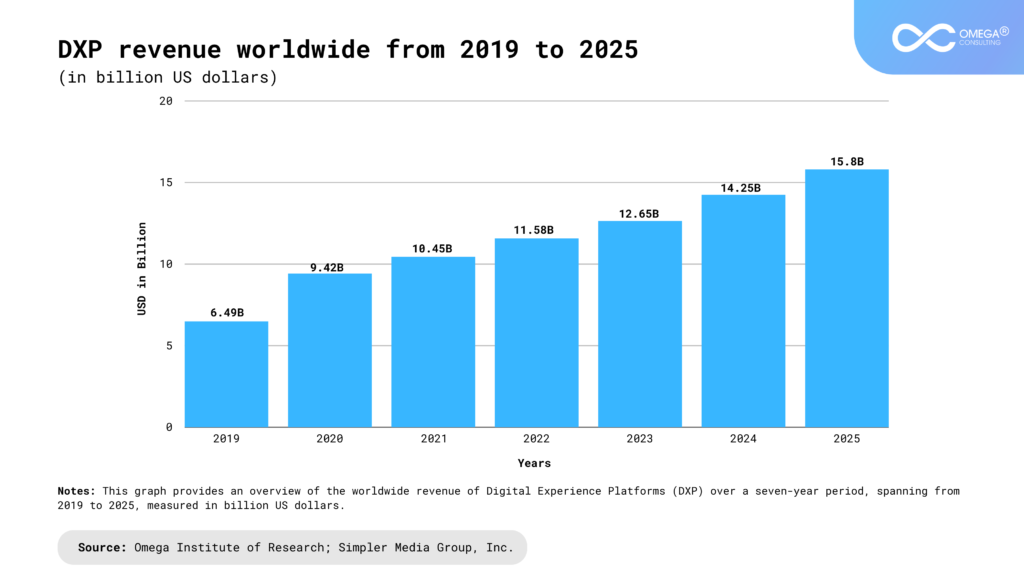- Industries
Industries
- Functions
Functions
- Insights
Insights
- Careers
Careers
- About Us
- Information Technology
- By Omega Team

In the intricate tapestry of modern business, where digital interactions reign supreme, Digital Experience Platforms (DXPs) emerge as indispensable tools for Chief Information Officers (CIOs) and Chief Technology Officers (CTOs). DXPs, encapsulating a suite of integrated technologies, stand as architects of a seamless and personalized user experience across diverse digital channels. Acting as a centralized hub, these platforms harmonize critical components such as content management, analytics, and customer relationship management (CRM). This article is tailored for CIOs and CTOs, unraveling the pivotal role of DXPs in navigating the complexities of the digital landscape. As custodians of technological strategy, understanding how DXPs unify and enhance digital experiences becomes paramount in shaping business success and customer satisfaction.
Digital Experience Platforms
Defining Digital Experience Platforms
Digital Experience Platforms, often abbreviated as DXPs, represent an integrated suite of technologies designed to deliver a seamless and personalized user experience across various digital channels. These platforms serve as a centralized hub, bringing together content management, analytics, customer relationship management (CRM), and other crucial components to create a unified and cohesive digital experience.
Evolution of Digital Experience Platforms
The inception of DXPs can be traced back to the need for businesses to adapt to the changing digital landscape. As consumers increasingly shift towards online interactions, businesses seek ways to provide a consistent and engaging digital experience. DXPs emerged as a response to this demand, evolving from the convergence of various technologies.

Components and Features of Digital Experience Platforms
Content Management
At the core of DXPs is a robust content management system (CMS) that enables businesses to create, manage, and deliver digital content seamlessly. This includes text, images, videos, and other multimedia elements that form the foundation of a compelling digital experience.
Customer Data Management
DXPs leverage advanced customer data management capabilities, allowing businesses to gather, analyze, and utilize customer data effectively. This enables the delivery of highly personalized experiences based on user preferences, behaviors, and interactions.
Omnichannel Capabilities
In the era of multichannel interactions, DXPs offer omnichannel capabilities, ensuring a consistent and coherent user experience across various touchpoints. Whether it’s a website, mobile app, social media platform, or any other channel, DXPs provide a unified experience that transcends individual platforms.
Analytics and Insights
The power of DXPs lies in their ability to generate actionable insights through advanced analytics. Businesses can leverage data-driven decision-making to understand user behavior, optimize content, and refine digital strategies for better outcomes.
Integration with Third-Party Systems
To maximize efficiency, DXPs seamlessly integrate with a wide array of third-party systems, such as CRM platforms, e-commerce solutions, and marketing automation tools. This integration ensures a holistic approach to digital experience management.
Applications of DXPs
Digital Experience Platforms (DXPs) offer a multifaceted array of applications that resonate across various industries, influencing both customer-facing interactions and internal operational efficiencies. Here’s a closer look at the nuanced applications of DXPs:
Digital Experience Management
DXPs excel in delivering personalized and seamless digital experiences across diverse channels, encompassing websites, mobile applications, and social media platforms. These platforms enable businesses to tailor interactions based on user preferences, behavior, and demographics.
E-commerce Optimization
In the realm of e-commerce, DXPs act as unified platforms for efficiently managing product information, overseeing online transactions, and facilitating customer interactions. Furthermore, these platforms support personalized recommendations and ensure a seamless and engaging transactional experience.
Employee Engagement and Collaboration
DXPs extend their impact to internal realms by fostering employee engagement and collaboration. Through the creation of intranet portals and interactive training modules, these platforms facilitate seamless communication, enhancing teamwork and overall employee satisfaction.
Marketing Automation
DXPs streamline marketing efforts by providing comprehensive tools for designing, executing, and analyzing multi-channel marketing campaigns. Integration with Customer Relationship Management (CRM) systems enhances targeting, personalization, and the overall effectiveness of marketing initiatives.

Types of DXPs
Different types of DXPs emerged over time to cater to different industry use cases. While some DXPs specialize in the pre-purchase journey, others hone in on after-sales care.
CMS DXPs (Content Management System DXPs)
CMS DXPs extend the capabilities of traditional CMS platforms by incorporating advanced analytics and persona-based segmentation. These platforms are tailored for optimizing the pre-purchase journey, focusing on customer acquisition, lead nurturing, and the delivery of personalized promotions. Examples include Adobe Experience Manager and Sitecore Web Content Management.
Portal DXPs
Portal DXPs specialize in nurturing long-term customer relationships post-sale. Comparable to microsites, these platforms aggregate personalized content, enabling customers to self-service. Particularly valuable for experiences requiring user login, such as in mobile banking, Portal DXPs provide analytics on customer loyalty, retention, and engagement. Suited for industries like fintech and manufacturing, these platforms measure metrics like Customer Satisfaction (CSAT) and Net Promoter Score (NPS). Portal DXPs encompass features ranging from CMS and mobile support to workflow automation, with a focus on both frontend presentation and backend functionality.
The Role of Digital Experience Platforms in Business Transformation
Enhanced Customer Engagement
DXPs empower businesses to engage customers in a more meaningful and personalized manner. Through tailored content, targeted marketing, and real-time interactions, businesses can foster deeper connections with their audience, leading to increased loyalty and satisfaction.
Streamlined Operations
By centralizing various digital functions, DXPs contribute to streamlined operations. Content creation, management, and distribution become more efficient, reducing the time and resources required to maintain a compelling online presence.
Agility and Adaptability
In the dynamic digital landscape, businesses need to be agile and adaptable. DXPs provide the flexibility to adapt quickly to changing market trends, technological advancements, and customer preferences, ensuring that businesses remain competitive in the long run.
Improved Marketing Effectiveness
Digital marketing is a cornerstone of business success, and DXPs play a pivotal role in enhancing marketing effectiveness. With the ability to analyze customer data and tailor marketing strategies accordingly, businesses can achieve higher conversion rates and ROI.
Personalization at Scale
Personalization is a key driver of customer satisfaction, and DXPs enable businesses to achieve personalization at scale. Through intelligent algorithms and analytics, DXPs deliver content and experiences that resonate with individual users, creating a more immersive and relevant digital journey.

Challenges and Considerations in Implementing Digital Experience Platforms
Integration Complexity
While DXPs offer seamless integration with various systems, the complexity of integration can pose challenges. Businesses need to carefully plan and execute integration processes to ensure smooth operations and data flow across different platforms.
Data Security and Privacy
As businesses gather and utilize vast amounts of customer data, ensuring data security and privacy becomes paramount. Implementing robust security measures and adhering to data protection regulations are essential considerations in the deployment of DXPs.
Customization and Scalability
Every business is unique, and the ability to customize a DXP to align with specific business requirements is crucial. Additionally, scalability is vital to accommodate the evolving needs of a growing business. Balancing customization with scalability is a key consideration in DXP implementation.
Future Trends and Innovations in Digital Experience Platforms
Artificial Intelligence and Machine Learning Integration
The future of DXPs lies in the integration of artificial intelligence (AI) and machine learning (ML) technologies. This will enable even more sophisticated personalization, predictive analytics, and automation of routine tasks.
Augmented and Virtual Reality Experiences
As AR and VR technologies continue to advance, DXPs will likely incorporate these immersive experiences to provide users with more engaging and interactive digital journeys.
Voice and Conversational Interfaces
The rise of voice-activated devices and conversational interfaces presents new opportunities for DXPs to enhance user experiences. Businesses may increasingly leverage voice commands and chatbots as part of their digital strategy.
Conclusion
In conclusion, Digital Experience Platforms have emerged as a cornerstone of digital transformation for businesses seeking to thrive in the digital era. From enhancing customer engagement to streamlining operations and improving marketing effectiveness, the impact of DXPs is profound and far-reaching. While challenges exist, the benefits outweigh them, and businesses that strategically implement DXPs stand to gain a competitive edge in the dynamic digital landscape. As we look towards the future, the evolution of DXPs with AI, AR, and other innovations promises to further revolutionize the way businesses connect with their audience, ensuring a compelling and seamless digital experience for years to come.
- https://www.netsolutions.com/hub/digital-experience-platforms
- https://www.qualtrics.com/experience-management/customer/digital-experience-platforms/
- https://www.sitecore.com/knowledge-center/digital-marketing-resources/what-is-a-dxp
- https://www.comwrap.com/en/blog/digital-experience-platforms-a-guide-for-digital-leaders.html
- https://www.cmswire.com/digital-experience/what-you-need-to-know-about-digital-experience-platforms/
Subscribe
Select topics and stay current with our latest insights
- Functions